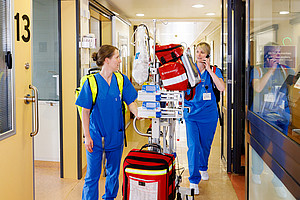
Launch of a Europe-wide crisis network coordinated by Charité
Berlin, 27.12, 2023
The COVID-19 pandemic has impressively emphasised the relevance of sufficient and well-trained nursing staff in coping with crises. However, healthcare stakeholders continue to face a shortage of skilled nursing staff. The EUCARE project, coordinated by Charité – Universitätsmedizin Berlin, is addressing this weakness in European healthcare systems. Over the next three years, it will develop an international training programme and prepare intensive care nurses to work across borders in crisis situations. The project was initiated by the European University Hospital Alliance (EUHA) nursing network set up at Charité. It is supported by the ERASMUS+ education programme.
Learning from the crisis: COVID-19 reached the European continent at the end of January 2020. The pandemic spread in waves. Hospitals and intensive care units were repeatedly stretched to their limits and specialised staff became scarce. However, the individual waves with a large number of seriously ill people did not reach every European country at the same time. So what would it be like if urgently needed nursing staff could be deployed across Europe in this type of crisis? If the available staff could be deployed in one country or another?
Even during the pandemic, the members of the EUHA, the association of leading European university hospitals, exchanged knowledge and best practice with each other. In response to the numerous current crises and the scarcity of specialist staff, the Nursing Network of the hospital alliance is now launching a joint further training programme for the intensive care sector. The aim is to create a network of specialised, interculturally trained intensive care nurses who are also prepared to work in other European countries in the event of a crisis. The aim is to ensure safety and quality in intensive care across Europe.
The three-year EUCARE project will facilitate the exchange and transfer of clinical knowledge between nursing experts from the EUHA partner hospitals, explains the project coordinator at Charité, Alexander Lang: “The participants will complete practical training modules and take part in workshops and lectures. At the end of the programme, the EUHA intensive care nurses have solid skills specifically geared towards working in times of crisis. They are also trained in interdisciplinary, interprofessional and cross-cultural collaboration.” The curriculum will be tailored to the acquisition of these specialised skills.
In addition, there will be a network for all nurses participating in the programme in order to continue the professional exchange and be prepared for deployments. In the event of a pandemic, disaster or other crisis, the network can be activated quickly. And in the long term, it can be a valuable resource for specialised professionals with intercultural knowledge. The programme is one of the first of its kind in the care sector. It is supported by the European Union in the ERASMUS+ programme with around 400,000 euros.
The funds will initially be used to develop, test and disseminate the training programme. In the long term, the programme will be anchored at European level. “We are offering transnational training opportunities in intensive care and jointly developing evidence-based standards for care in crisis situations, which should endure beyond the programme. We are delighted that this project coincides with Federal Health Minister Lauterbach’s initiative to regulate specialised nursing skills in Germany in a way that is legally and internationally compatible,” says Carla Eysel, Charité Board Member for Human Resources and Nursing.
All ten members of the EUHA support the EUCARE project, with six members actively involved in its organisation. The practical units take place in the respective hospitals and supplement the theoretical learning units. All learning content is then made available online and free of charge on a European platform.
About the EUHA
The European University Hospital Alliance consists of ten leading European university hospitals with proven excellence in healthcare, education and research: Aarhus University Hospital, Denmark; Assistance Publique – Hôpitaux de Paris, France; Charité – Universitätsmedizin Berlin, Germany; Erasmus MC, Rotterdam, Netherlands; Ospedale San Raffaele, Milan, Italy; Karolinska University Hospital, Stockholm, Sweden; King’s Health Partners, London, United Kingdom; UZ Leuven, Leuven, Belgium; AKH Vienna & MedUni Vienna, Austria; Hospital Campus Vall d’Hebron Barcelona, Spain. The institutions are working together to improve patient care now and in the future. All members have a capacity of more than 1,000 hospital beds and are centres of excellence in research and national reference centres. They cover the existing European Reference Networks (ERNs). The motto “Leading by Doing” stands for the intention to be a competent advisor at European level and to develop innovative solutions for central challenges in the European healthcare system.
Image: Carers in intensive care units: a valuable resource, not only in times of crisis. © Lichtbilder Berlin | Robert Lehmann
